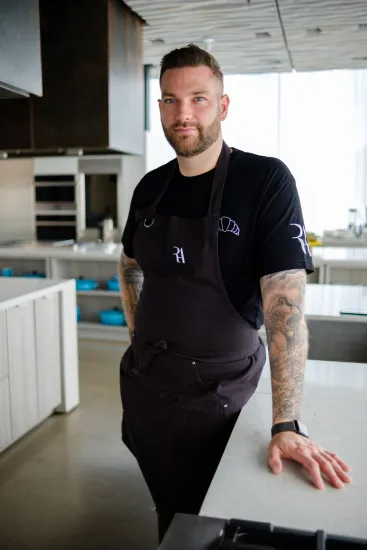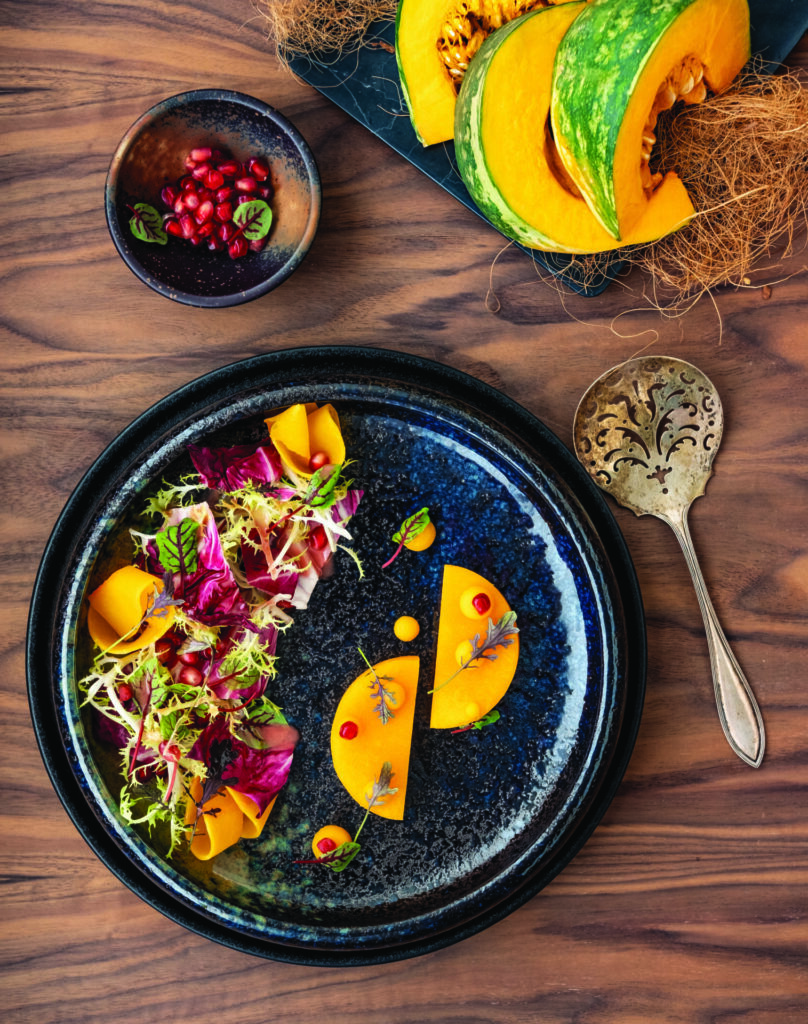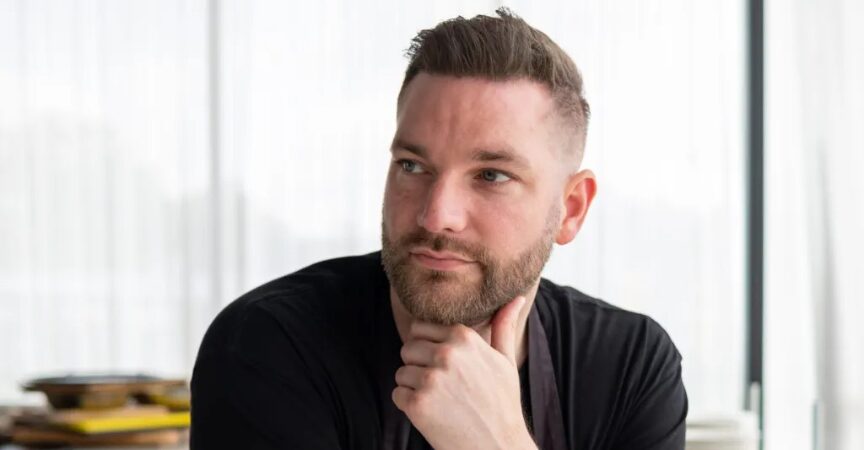The Interview with Chef Romain Avril

Few chefs can claim to have stepped into a professional kitchen at 13. Fewer still can say they spent the next two decades immersed in the pursuit of Michelin stars, executive titles, and ultimately, restaurant ownership. Chef Romain Avril’s career has been nothing short of extraordinary—not just for how early it began, but for how boldly it’s evolved.
A gifted young chef who rose through the ranks with rare speed, Avril has long been celebrated for his technical precision and creative finesse. But it’s the evolution of his leadership—and his growing commitment to lifting others up—that truly defines his influence today. Disillusioned by the systemic inequities and outdated power structures he encountered in fine dining, Avril stepped away from the traditional restaurant model just before the pandemic. In its place, he’s built a new kind of career—one that fuses entrepreneurship, education, and advocacy.
From the collapse of his own restaurant venture during COVID to a reimagined business grounded in private dining, consulting, and media, Avril has forged a path that honours both his craft and his conscience. Central to that journey is a deep dedication to the next generation. Whether he’s in a classroom, on set, or mentoring young chefs in the kitchen, Avril is focused on sharing what he’s learned—about success, failure, reinvention, and the values that matter most.
In this conversation, he reflects on the lessons of an early start, the urgency of generational change, and why building a better kitchen starts with the people coming up next.
MENU: You’ve really transformed the focus of your career over the past few years. Had you already been exploring consulting and private chef work before the pandemic—and COVID simply accelerated that shift? Or was it more of a direct response to what happened during that time?
Romain Avril: Absolutely a consequence. I think for a lot of people, COVID got us out of our regular shell and showed us a world that was very different. I mean, I started culinary school at 13, so I didn’t really have a full teenage experience or youth. I was always in the kitchen. Don’t get me wrong—it’s not a sad story. I’m really happy with where I am and how I grew. It allowed me to get to higher positions much younger.
That said, I think I would have appreciated having more time to think about other options—other ways of being in the kitchen and in hospitality. COVID gave me that pause for the first time in 20 years. It let me reflect on my life, my health, my mental health, and my physical health. I made a lot of changes in both those areas, which I don’t think I would’ve done if I were still stuck in that grind—getting up in the morning, going to the kitchen, cooking, going home, repeat.
So yes—one million percent—it was the breaking point that changed everything in my career and my life.
MENU: You’re originally from France, where the perception of chefs and the culinary arts is quite different. What was it like when you came to Canada? What stood out to you in terms of how chefs are regarded in Europe versus here?
RA: Night and day. I mean, that’s the best way to describe it. I almost packed my bags after a couple of months. I felt like a coward for even thinking that—but maybe it was just too much. I mean, when I moved here, I was 25. I already had 12 years of cooking under my belt—12 years of hard labour, of being appreciated and recognized.
I came to Canada in 2010 and walked into my first kitchen here and thought, “Oh my God, it’s like starting over.” There was just such a world of difference, and I didn’t know if I wanted to do that—to start from scratch again. In Toronto especially, I felt like there was no real connection between guests and food. People cared more about the look of the restaurant, about trying new things—they didn’t care about the food itself. You could serve them an overcooked steak with fries, and they’d
be happy.
One of my first jobs was at Colborne Lane, where we were doing molecular gastronomy—highly technical, tweezered-out plates—because that’s all I knew. But we had to shut down because people didn’t understand what we were serving. And I honestly thought, maybe this country isn’t for me. But instead of quitting and going back to what was familiar, I decided to stay, thinking I might be able to help shape a different kind of industry here.
It wasn’t about me trying to change the world—it was more like, “Let’s see how this evolves.” And 15 years later, the industry and the relationship between people and food have changed tremendously. I’m really glad I stuck around. People here are valuing food in a much deeper way than when I first arrived.
So yes—there was definitely a big difference. But also, the world has changed. And outside of hospitality, just in terms of culture and geography, it was good for me to learn that there isn’t just one right way. There are many ways—and they all deserve to be embraced and appreciated equally.
MENU: You’ve talked so much about elevating Canadian culinary talent on the world stage. As an immigrant and top chef, what do you wish the global food community understood about what Canada has to offer?
RA: We’re in a moment not unlike where Denmark was 15 years ago. Back then, people underestimated Nordic cuisine. Then restaurants like Noma put it on the map—and suddenly everyone was paying attention to the ingredients, the technique, the philosophy. Canada has that same potential. Our geography, our climate, even our culinary DNA—it’s all here. But we’re still waiting for the world to recognize it.
I was recently blown away by a tasting menu at Joni, in Toronto. The chef, Jonathan Williams, created a meal that perfectly embodied what modern Canadian cuisine could be: precise, ingredient-driven, balanced, expressive. It was refined without being showy. If that restaurant were in Copenhagen or Tokyo, it would already have a Michelin star or two.
But Canadian fine dining still doesn’t always get the recognition it deserves—especially when it’s rooted in Canadian identity. Restaurants that proudly showcase Canadian ingredients and culture often go unnoticed, especially if they aren’t part of the traditional fine dining mould.
And we need to change that. Canada has world-class lamb, beef, wild game, fish, berries—you name it. In some ways, we have the land and resources to be one of the most sustainable food cultures on the planet. But we need to invest in showcasing it, both at home and internationally.
Because when our own chefs don’t feel recognized, they leave. They go to Europe, Asia, the U.S. We lose our best talent. But if we can celebrate what makes Canadian food unique—and tell that story with pride—then we can build an ecosystem that nourishes talent, keeps it here, and helps it thrive.


MENU: Let’s talk a bit about the lingering misconceptions around culinary and hospitality careers. You teach, you mentor—you’ve supported a great many young chefs. Based on your experience, especially coming from France where the culinary arts are often held in higher regard, what are you hearing from young people today? What are the myths or perceptions that hold them back from fully pursuing careers in this industry?
RA: The two biggest misconceptions I still hear are about the long hours and the low pay—and unfortunately, they’re often true. I’ve spent a lot of time thinking about how we can shift that. In Europe, especially in France, change has come through government intervention. Chefs were required to limit staff to 35–38 hours a week, so they restructured schedules—working longer days over fewer shifts. It wasn’t perfect, but it was a step in the right direction.
Here in Toronto, the cost of living makes it incredibly hard for people in hospitality to get by—especially when wages haven’t kept pace. I’ve seen firsthand how hard it is to pay people fairly and still keep the business afloat.
In my view, the true root of the problem is the cost of rent. If operators had more manageable overhead, they could invest in higher wages and better staffing. I’ve run the numbers—what really puts pressure on restaurants isn’t the food or labour costs, it’s the rent. Until that changes, it’s difficult to make the kind of improvements we need to retain talent and build more sustainable careers in hospitality, especially in large cities.
MENU: Are these ideas partly what first drew you to teaching?
RA: I come from a family of teachers—my mother and brother both teach—so education has always been a big part of my values, even though I wasn’t exactly a model student. I was the kind of kid who got bored easily, disrupted class, and cracked jokes. But I still loved learning, especially once I got into culinary school. Later, I even went back for management training and university courses. So while I wasn’t the best classmate, I deeply respected the value of education.
That’s why it bothers me when I see people online saying things like, “School is useless—I didn’t learn anything.” You absolutely can learn, and what’s most important isn’t just the cooking—it’s everything else. In France, our culinary schools were rigorous. We studied geography, math, economics—things that have nothing to do with cooking, until suddenly they do. When you become a chef or run a kitchen, you need those skills. You’re dealing with formulas, inventory, costing, staffing—things that aren’t taught when you’re just peeling potatoes at 15.
MENU: Why do you believe accessible education is so critical to the future of the hospitality industry?
RA: Here in Canada, I think we’re still catching up. I often hear from mentees who are already in leadership roles but don’t know how to build a cost sheet or manage inventory—because they never learned it in school. That gap between school and the reality of the industry is something we really need to close. We should be preparing students not just to cook, but to lead, to run a business, to thrive in the real world of hospitality. Teaching has become a passion of mine. It’s not about the money—it’s something I do for the joy of it. The feedback I get tells me my approach is different—I’m not rigid, and I try to go beyond the curriculum to bring real-world context. That’s what we need more of: not just teaching what’s on the page but preparing people for what it’s really like out there. And we also need to ensure the industry is ready to receive them. The better we align education with reality, the stronger our sector will be.
MENU: Alongside teaching, you’ve also leaned into competition, media, and social platforms. These are areas many chefs are exploring more and more—especially when balancing multiple career paths. How do those experiences fit into your own journey, and how do they help emerging talent break through?
RA: For me, those experiences have been essential. I did my first cooking competition at 15 or 16. It’s not for everyone, and that’s okay, but I think everyone should try it at least once. I was a shy kid, especially in the kitchen, and competing really helped me come out of my shell. It gave me confidence and pushed me to grow into a leader.
But competition shouldn’t be about ego. It’s not about being “the best”—that means nothing to me. It’s about being better than you were yesterday. If more people approached it that way, the industry would be less ego-driven and more collaborative. That mindset—of continuous self-improvement—is something I try to pass on.
Competitions can also shine a light on untapped talent. I’m currently involved with Bocuse d’Or Canada, which is about showing the world that Canadian chefs are a force. We’ve had incredible candidates making it to the global top 10, and that kind of recognition matters—not just for the individuals, but for the national culinary identity.
Some of the most talented chefs in the world will never be seen, simply because there’s no spotlight on them. Media visibility can help create those opportunities—whether it’s a career breakthrough, a job offer, or simply the chance to be recognized. And I’ve seen the impact firsthand. In England, I once competed in a year-and-a-half-long program where 12 sous chefs were selected from across 50 hotels. We met regularly, learned about local farming, business, and cooking—and the winner was promised their own hotel. It was intense and incredibly motivating. I was leading the competition, but chose to move to Canada before it wrapped. They weren’t thrilled with me—but I have no regrets.
Competitions like that can unlock potential and offer real growth for people who might otherwise go unnoticed. That’s also how I lead. I’ve never been the type to hide recipes or hold back knowledge. I want my team to know everything—because when they succeed, we all succeed. I never understood the idea of hoarding information. I’d rather come in at 9 a.m. and have a well-oiled kitchen than hide a technique and make everyone’s life harder.
MENU: You work closely with emerging talent. What should restaurant operators understand about this next generation—and how can they better prepare to welcome them into the workplace?
RA: That’s a great question, and honestly, I’m still figuring it out myself. There’s a real generational gap right now—20 or even 30 years between the people who own restaurants and those just entering the workforce. And the codes, the communication styles, even the values are different. As someone in my late 30s, I already feel a disconnect when I return to my old culinary school each year to speak with students. The first few times, they were curious about my work. Now, the focus is more on social media—“Can I get a photo with you?”—and less about the craft itself.
But that’s not a criticism. It just means we need to adapt. The best thing operators can do is focus on communication. One-on-one check-ins. Saying hello and goodbye. Asking how someone’s day is going. We need to treat staff as individuals, not as a single group. You might have a 17-year-old, a 30-year-old, and a 50-year-old all on the same team. They’ll each bring different expectations and communication styles. So don’t treat them the same. Meet them where they are.
The more we personalize our approach, the better our kitchens will function—and the more successful we’ll be at bridging that generational gap.
MENU: As a chef and a leader, what would you say are your most deeply held values—and how do you instill those in your staff and students?
RA: My values in the kitchen are the same ones I live by outside of it. I don’t think we should check our principles at the door when we come to work. I’ve heard too many times, “He’s a great guy, but in the kitchen—watch out.” That’s not okay. You shouldn’t be two different people. If you’re respectful at home, be respectful at work.
I try to lead by example. I keep my private life fairly private, even on social media, but my approach is consistent. I also believe strongly in respecting the country I live in. I’m an immigrant, so it’s important to me not to walk into a kitchen and say, “Well, this is how we did it in France.” Instead, I adapt to my surroundings and make sure my team feels comfortable and safe.
I grew up in a socialist family, so fairness and equality are at the core of everything I do. That means making space for everyone—regardless of gender or background. My kitchens have always been close to 50/50 in terms of gender, and that’s not by design, it’s just what happens when you hire based on merit and create an inclusive culture. Same goes for race and background. If you’re good, you’re good—end of story.
When I was younger, I saw how toxic and discriminatory kitchens could be. I’ve had to fire incredibly talented staff because they crossed a line with a female colleague. I won’t tolerate that. Kitchens need to be safe spaces. If something happens, people need to know they’ll be heard, and that we’ll take action. That’s non-negotiable. And I know this might sound idealistic, but I really believe it’s possible. And it’s why I speak up—especially to the next generation of white male chefs. We need to model a different kind of leadership. If I can leave behind even a small shift in mindset—that it’s not about ego or dominance, but about integrity and respect—I’ll be happy with that legacy.
MENU: Was there a moment early in your career where a mentor really shaped how you show up for younger chefs today?
RA: Honestly, I didn’t really have a mentor. I have one now—in the cannabis culinary space, where I’m still learning—but earlier in my career, no. I had chefs who praised me constantly, and at the time it felt great. But looking back, it created an inflated sense of ego. I was being told I was the best student, the best cook, the best everything—and that’s dangerous. It made me arrogant. I’ve since learned that the better message is: “You’ve got potential, and if you keep working, you’ll go far.”
That’s how I try to mentor now. I want to help young chefs avoid the mistakes I made. I know I’m midway through my career—and I don’t want to take up space forever. There are people in this industry who are holding on to the spotlight for too long. I want to pass the mic. I’m happy to be in the wings, to support the next generation and help them shine.
Follow Chef Romain Avril:
IG @chefromainavril | chefromainavril.com









